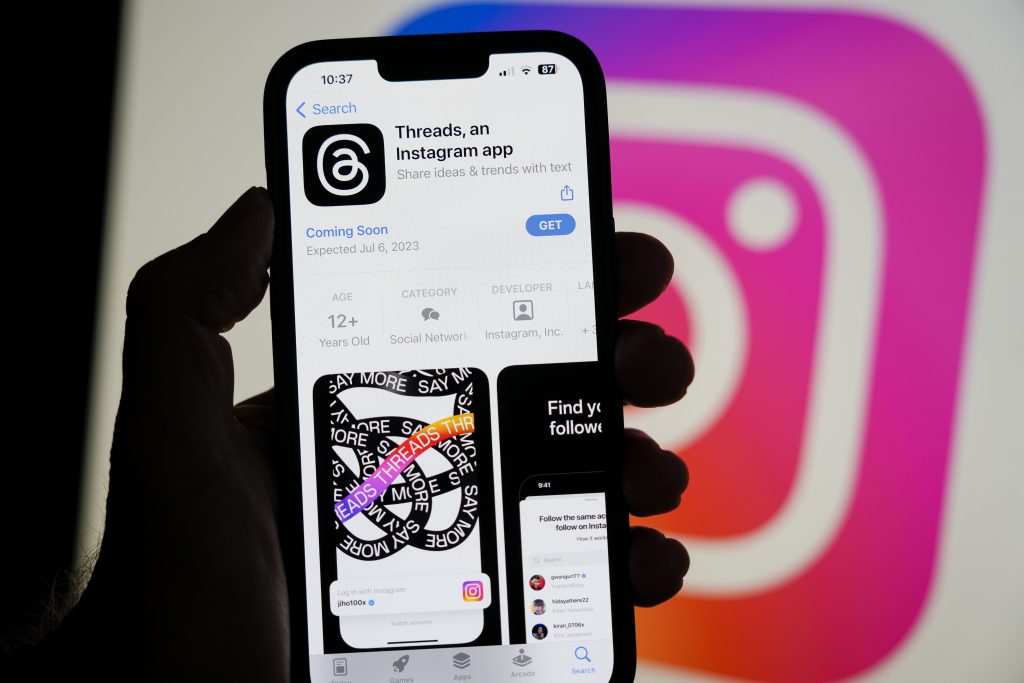Meta Platforms Instagram officially unveiled Threads, an app designed as a direct rival to Twitter, launching the most serious threat yet to Elon Musk’s struggling social-media site.
On Threads, people can post text and links and reply to or repost messages from others. The app will let users port over their existing follower lists and account names from Instagram, Meta’s photo and video-sharing app that counts major brands, celebrities and creators among its more than 2 billion users.
The app garnered more than 5 million sign-ups in its first four hours, Meta founder Mark Zuckerberg said on his Threads account. That’s still a far cry, however, from Twitter’s more than 300 million.
“There should be a public conversations app with 1 billion-plus people on it,” the Meta chief executive officer said in an earlier post on Threads. “Twitter has had the opportunity to do this but hasn’t nailed it. Hopefully we will.”
Many of Instagram’s influential users have been asking the company to make a text-based app, according to Connor Hayes, a vice president of product.
“Creators were telling us, ‘We want an alternative to what’s out there, and we don’t want to start over and have to build out a following from zero,’” Hayes said in an interview, without mentioning Twitter specifically.
Instagram and Facebook, both owned by Meta, have a long — and successful — history of copying products from upstart internet competitors. The company’s Reels feature was a knockoff of TikTok’s viral video app, and its Stories disappearing posts followed the rise of Snap’s Snapchat. Meta’s apps in the past have competed indirectly for user attention with Twitter by courting news publishers, politicians and other high-profile people to favor posting on one versus the other. The arrival of Threads marks the first time Meta is releasing a Twitter lookalike.
On Wednesday, Zuckerberg tweeted for the first in 11 years — taking a playful swipe at his billionaire rival, who in turn called Instagram fake.
The timing seems propitious for Meta. Since Musk acquired Twitter for $44 billion in October, the company has cut thousands of employees, loosened its content moderation policies and put users and advertisers through a spate of technical challenges.
Twitter is hurting financially, too. Advertising revenue at the San Francisco-based company has declined by 50%, Musk said in March, and he recently hired Linda Yaccarino, a NBCUniversal executive, as chief executive officer to try to improve relationships with brands.
As of the Wednesday launch of Threads, Twitter is still limiting how many tweets per day users can view — a measure Musk called “temporary” in order to fend off data scrapers and bots.
Those restrictions are only the latest move prompting Twitter users to seek alternatives. But most of the company’s previous direct challengers, such as Bluesky and Mastodon, haven’t built up networks big enough to give posts the reach and impact they have on Twitter. Many new alternative networks are also still building out systems for managing harmful, inappropriate or violent content.
Threads will embark with all those mature company systems in place, thanks to Instagram’s existing infrastructure. The app will have the same content rules as Instagram, with the same controls for muting and blocking harassing accounts. Public figures who have verified accounts on Instagram can maintain their blue badges on Threads. Earlier this year, Twitter turned verification into a paid-only feature.
“People are looking for an experience where they have more control, and where safety is built into the product from the start,” Hayes said.
Another selling point, Hayes said, is that Threads is built on the same ActivityPub social-networking protocol as Mastodon and other decentralized social-media apps. That means people who build followings on Threads eventually will be able to use the app to interact with a wider community beyond Instagram. It’s the first Meta app that will be interoperable with competing products, though Hayes didn’t give a timeline for that update.
Threads is also launching without ads — for now, the focus is to get as many people excited about the product as possible, Hayes said.
© 2023 Bloomberg

